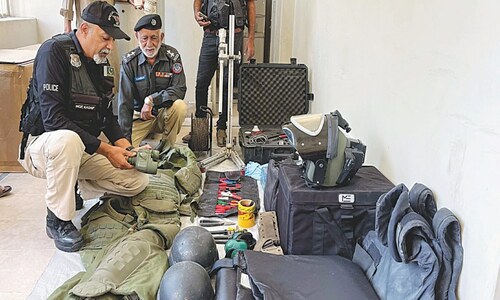KARACHI, March 6: Preetamdas is a doctor doing a hospital job and also running his private clinic, yet all he thinks about is leaving Pakistan, terrified over a rise in what he believes the 'targeted killing and kidnapping of Hindus'.
A successful professional, he lives in Karachi with his wife and two children, but comes from Kashmore.
His ancestors lived in Sindh for centuries and after the 1947 partition, his grandparents chose to stay with Muslims in Pakistan. They fervently believed Muhammad Ali Jinnah's promise that religious minorities would be protected.
Sixty years later, their grandson says “life in Kashmore has become unbearable. The situation is getting worse every day.”
Two of his uncles have been kidnapped and affluent Hindus are at particular risk from abduction gangs looking for ransom, he argues.
Rights activists say the situation is indicative of 'progressive Islamisation' over the last 30 years that has fuelled an increasing lack of tolerance to religious minorities, which they claim, are too often considered the second class citizens.
Preetamdas says the only thing keeping him in Pakistan is his mother. “She has flatly refused to migrate, which hinders my plans. I cannot go without her,” he says.Hindus make up 2.5 per cent of the country's population and over 90 per cent of them live in Sindh, where they are generally wealthy and enterprising, making them vulnerable to criminal gangs.
An official at the ministry of external affairs in New Delhi who declined to be named said: “Every month about eight to 10 Hindu families migrate from Pakistan. Most of them are well-off.” He had no comment on whether the number was on the rise, but Hindu community groups in Pakistan say more people are leaving because of kidnappings, killings and forced conversions of girls to Islam.
“Two of my brothers have migrated to India and an uncle to the UAE,” says Jay Ram, a farmer in Ghotki.
“It's becoming too difficult to live here. Sindhis are the most tolerant community in the country vis-Ã -vis religious harmony, but deteriorating law and order is forcing them to move unwillingly,” he feels.
Ramesh Kumar Vankwani, chief of the Pakistan Hindu Council and a former lawmaker from Sindh, alleges that Hindus are picked on by kidnappers and that their daughters are subject to forced conversion to Islam.
“Every now and then we get reports of families migrating. It's getting worse now. People are extremely harassed and are forced to leave their homeland but our rulers are shamelessly idle,” he moaned.
Rights activists also claim that Hindus in Sindh are discriminated against. “Recently 37 members of five Hindu families migrated to India from Thull town owing to discrimination while three Hindus, including a doctor, were murdered in the Shikarpur district,” said Rubab Jafri, who heads a human rights forum.
“Lots of violent incidents happen daily. Most go unreported, which shows vested interests are trying to force Hindus to leave Pakistan.”
According to the Pakistan Hindu Seva, a community welfare organisation, at least 10 families have been migrating from Sindh every month since 2008, mostly to India, and in the last 10 months, 400 families have left Pakistan.
A survey conducted last year by the local Scheduled Caste Rights Movement said more than 80 per cent of Hindu families complained that Muslims discriminated against them by using different utensils when serving them at food stalls. “Hindu migration is a brain-drain for Pakistan as most of them are doctors, engineers, agriculturists, businessmen and intellectuals,” Ms Jafri said.
But the provincial auth- orities are reluctant to recognise a problem.
“I do admit that law and order in some districts of Sindh is quite bad, but it is bad for everyone and not just my community,” said Mukesh Kumar Chawla, the Sindh Minister for Excise and Taxation.
“Hindus do not migrate in flocks as has been claimed and those who migrate are going abroad for a better fortune,” he said.—AFP














































Dear visitor, the comments section is undergoing an overhaul and will return soon.